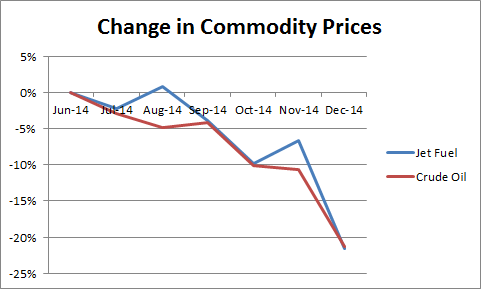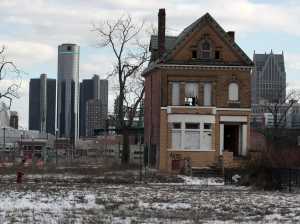Blog Archives
… Detroit
I should start by saying that this post is not really about economics so much as finance, but it should certainly interest anyone interested in public finance, the Detroit bankruptcy, the lunancy that sometimes encapsulates our financial system, and the Great Recession that the world is still recovering from.
Today and through the coming weekend it looks like lawyers from Detroit, Bank of America, UBS, and Syncora Guarantee will be negotiating a possible settlement which stands as a major hurdle to the city emerging from bankruptcy. I read the details of the dispute today in the New York Times DealBook, and it seems like classic pre-2008 bonanza economics backfiring on us once again. It just seems so clear to me that this would not make sense. Please let me know if you think I am missing something, but here is my take on things:
In 2005 Detroit had to make a $1.4 billion payment to its pension plan. There wasn’t any money to be found, so they floated bonds. Bank of America and UBS underwrote the offering, and Syncora Guarantee, as well as the Financial Guaranty Insurance Company (FGIC), insured the bonds, ostensibly protecting investors against losses. Ya know, just in case Detroit couldn’t pay.
Detroit did not want to have to reach too deep to keep the labor peace, so the bonds were floating rate. Just in case rates went up, they bought interest rate swaps from their friends at Bank of America and UBS. If interest rates went up the banks would cover the additional payments to the investors, and in the event rates went down Detroit would have to pay the banks.
And in the great legal morass that is Wall Street, the banks decided to spin one more web. They insured the interest rate swaps they entered into with Detroit. Ya know, just in case Detroit couldn’t pay. And the insurance companies were the same two that had already insured the bond payments to the investors.
In 2005 this mutually entangling deal was heralded as so innovative that it was awarded the Deal of the Year Award by The Bond Buyer trade publication. But this deal, along with all the other toxic waste from the pre-Recession bonanza, just shifted risk around. It never eliminated it, or mitigated it.
Interest rate swaps were all the rage in the aughts. I can see the bankers’ pitch book from my desk:
“Eliminate your interest rate risk with our interest rate swaps.”
“In this interest rate environment, you can’t leave your floating rate obligations out in the cold. Protect them with interest rate swaps from Goliath National Bank.”
Municipalities around the country piled into the deals, and they are now suffering the consequences. By their nature, swaps are contrarian bets. One side thinks rates will go up, one side things rates will go down (if rates stay the same it is essentially a push). Both sides enter into the deal thinking they’ve got the sweet end of the bargain. For the cities like Detroit, they figured interest rates were going to stay the same or go up. With this thinking, it was the perfect deal. They could essentially synthetically lock in a low rate by issuing the floating rate bonds and entering into the interest rate swaps. But on the other hand, banks would only enter into so many of these deals if the deal was sweet for them, AKA they figured interest rates were going to stay the same or go down.
Municipalities throughout the United States must have all been drinking the same Kool-Aid that the banks were dishing out, because the banks did well in the deals and the counties and cities are all suffering. And I don’t find this hard to believe. Banks have sophisticated interest rate projection models. Plus they have already been found to have been manipulating interest rates (granted, for trading advantage, not to profit from clients, but it still points to their less than honest intentions). Because of this, municipalities around the US (Jefferson County, Alabama comes to mind) have been fighting the banks in courts on the grounds that the swaps were improperly peddled to them.
Interest rate swaps were the first failure of basic human reason brought on by FBDS – Financial Bonanza Disillusionment Syndrome. The second was for the same two companies, Sycora and FGIC to take on all of the risk in the deal. Not only did the bond insurers guarantee the bonds, they also guaranteed the swap payments for the banks. And that seems beyond the limit of reasonable risk to me. It stands to reason that if Detroit was having trouble making bond payments it would also be having trouble making any required interest rate swap payments. Maybe the bond insurers were hoodwinked by the same bankers who sold the interest rate swaps to the city.
The rest is history. Rates went down, so Detroit had to pay up to the banks. The just in case Detroit couldn’t pay turned into the largest Chapter 9 in US history. In the end, Detroit is dealing with a great big tangled mess, not the grand feat of social-financial engineering that was lauded in 2005. The investors, the bond insurers, the city, and the pension fund are now all fighting it out to get the biggest piece of the pie. I wonder if anyone sitting in that room right now is saying, “What were we thinking back then?” My hope by publishing this post is that the next time someone has an idea like this they will use common sense, economic principles, and sound risk management to steer clear of another fiasco like the one Detroit is facing right now.
Sources:


